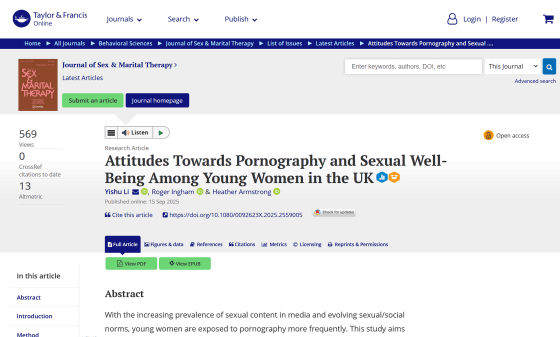Young women who are positive about pornography report higher sexual happiness, study finds

In recent years, easy access to online sexual content via smartphones and other devices has led young women to come into contact with pornography earlier and more frequently than before. New research has revealed that young women who have positive attitudes toward pornography tend to have higher sexual satisfaction and a sense of security about their own sexuality.
Full article: Attitudes Towards Pornography and Sexual Well-Being Among Young Women in the UK

Positive porn attitudes linked to better sexual well-being in young women
https://www.psypost.org/positive-porn-attitudes-linked-to-better-sexual-well-being-in-young-women/
The societal shift of young women's increased exposure to pornography is occurring alongside a growing acceptance of sexual exploration, a growing diversity of sexual identities and experiences, and evolving sexual norms. However, most research to date has focused on the negative effects of pornography, overlooking the complexity of women's experiences with pornography.
'Young women today are exposed to sexual content in a more open digital environment than ever before, but they still have to deal with cultural expectations that may influence their sexual experiences,' said Yishu Li, a PhD student at the Sexual Health Research Centre at the University of Southampton in the UK. 'Most studies to date have treated pornography use primarily as a matter of viewing frequency, making it unclear how attitudes toward pornography relate to specific aspects of sexual well-being.'
So, Lee and his team examined the processes that mediate young women's attitudes toward pornography and their 'sexual satisfaction' and 'comfort with sex,' which are core aspects of sexual well-being. 'This approach doesn't judge pornography as 'good' or 'bad,' but focuses on identifying which factors actually explain the associations observed,' Lee said.

The study involved 306 young women living in the UK. The average age of the participants was approximately 20 years old, and the majority were university students. The participants completed a comprehensive online questionnaire covering topics such as 'frequency of pornography viewing,' 'feelings after viewing pornography,' and 'ways of communicating with sexual partners.' They also measured their sexual satisfaction and overall comfort with their sex lives. Importantly, participants were differentiated based on whether they held positive attitudes toward pornography, such as 'it enriches sexual relationships,' or negative attitudes, such as 'it is problematic because it exploits women and has a negative impact on morals.'
Next, the research team analyzed whether factors such as 'frequency of pornography viewing,' 'feelings after viewing pornography,' and 'way of communicating with sexual partners' could help explain the relationship between women's attitudes toward pornography and their sexual well-being.
The analysis showed that women with more positive attitudes toward pornography tended to have higher sexual satisfaction and a greater sense of security about their sexuality.
In addition, women with higher sexual satisfaction and security in their sexuality reported more frequent and open sexual communication with their partners. On the other hand, frequency of pornography viewing and feelings after viewing pornography were not associated with positive attitudes toward pornography or sexual well-being. Although women who were positive about pornography tended to express more favorable feelings after viewing pornography, taking other factors into account, this did not significantly predict sexual well-being.
These results suggest that sexual communication with partners mediates the relationship between positive attitudes toward pornography and sexual well-being. In other words, sexual communication helps bridge the gap between positive attitudes toward pornography and satisfaction and comfort with one's own sexual experiences.

On the other hand, negative attitudes toward pornography were associated with negative feelings such as shame and guilt after viewing pornography, but were not significantly associated with lower sexual satisfaction or discomfort with sexuality. This suggests that while some women experience emotional tension regarding pornography, it does not necessarily lead to widespread problems in their sex lives.
'Our study found that in a sample of young British women, sexual communication alone was a significant factor in explaining the association between positive attitudes toward pornography and higher sexual satisfaction and comfort with sexual activity. However, frequency of pornography viewing and emotional responses did not play a role, and negative attitudes toward pornography were not associated with lower sexual well-being,' Lee said.
The researchers suggest that young women who view pornography as a normal or acceptable part of sexual exploration are more comfortable discussing sexual preferences with their partners, which may lead to greater sexual satisfaction and more positive sexual experiences. At the same time, their findings suggest that factors such as frequency of pornography viewing may not be as important to sexual well-being as previously assumed.
The study's results were based on self-reporting, which could be influenced by personal bias and social desirability.
Related Posts:
in Free Member, Science, Posted by log1h_ik







